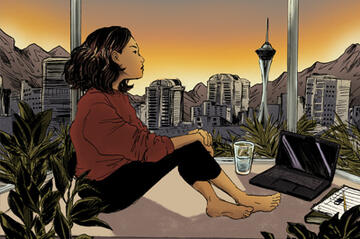From the moment it became clear that the coronavirus was going to upend everyone whose livelihood was tied to the Strip, the local unions, casino operators, and politicians came together to address the health crisis for hospitality workers, in a remarkable spirit of cooperation among groups that are often at odds.
As someone who works at a major casino resort, I was terrified when the casinos first shut down. I had no emergency fund in the bank. I had never heard of this happening before; I couldn't imagine what time off would mean for me financially. The longer the shutdown lasted, the more dread I felt that Las Vegas would never bounce back. As someone pursuing her master's degree in the William F. Harrah College of Hospitality, though, I found a solution to anxiety in these times of crisis that research in academia was the most valuable tool. I started studying this moment in time for my master's thesis.
In the first week of March, with only a few confirmed COVID-19 cases in Clark County, the response by the Culinary Union Local 226 and Bartenders Local 165 was to request that the casino companies offer paid sick leave to workers in the event of contracting the virus. Companies promised to monitor the situation. Soon they started voluntary shutdowns, followed by Gov. Steve Sisolak's state-mandated shutdowns of all casinos and resorts. The union continued negotiating with resorts to provide pay during the closures and identify potential job opportunities for laid-off employees.
This was different from previous crises, like Sept. 11 or the Great Recession. The travel industry overcame those issues with cheaper airfares and room rates. But the pandemic was marked by government-imposed travel bans and shelter-in-place orders that crushed the hospitality industry. Although the closures were devastating to the Las Vegas economy, hopes of a quick rebound and pent-up demand kept employees, unions, and companies focused on a safe and successful reopening.

The Research that Leads to Silver Linings
For students and professors alike, diving into their areas of expertise led to reasons for hope after a down year.
As early as April 23, the local Culinary Union and Bartenders Union joined forces with the Service Employees International Union Local 1107 to demand stronger employee protections. I was so relieved to hear that our city was preparing to reopen that I forgot to consider my own safety. When I heard the union demanding even more out of the company than just to reopen, I understood I didn't have to be at the mercy of the company. I was nervous, but extremely proud to support the union knowing from a historical perspective what it meant for my community.
The three unions represent close to 80,000 workers across the state. The demands made were based on CDC guidelines and included personal protective equipment and training for front-line resort workers, extended healthcare benefits for laid-off employees, temperature checks and testing requirements for employee, and other measures. Many casinos incorporated these guidelines but there would still be many areas needing improvement.
During the pandemic, the union has successfully provided health care security, job security, paid sick leave, unpaid leaves of absence for employees in need, and better training of front-line employees and managers to effectively respond to COVID-19 related situations. In coordinated efforts between the unions, the companies, and government officials, Las Vegas hospitality workers provide a template to be studied and reproduced by hospitality companies worldwide in combating this pandemic, and other similar crises in the future.
It was a return to form for organized labor from its heyday in the middle of the 20th century, and when we study the history of this moment, it may well prove to be a jumping-off point for labor relations in the coming years.
I had renewed faith in my union and a deeper understanding of why unions historically have been so necessary and successful against big corporations. I was also so proud of my employer, MGM Resorts, for working in cooperation with the union to display a united front instead of divided interests.



